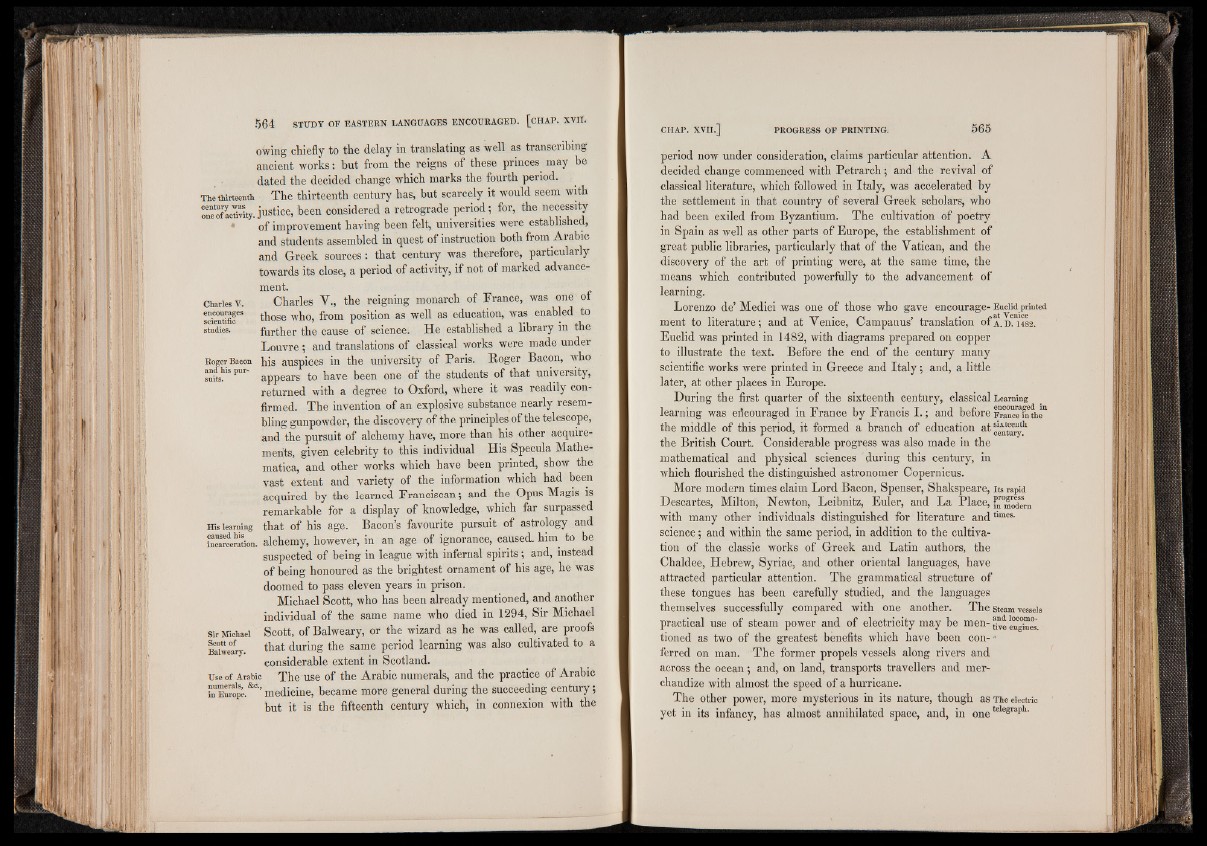
owing chiefly to the delay in translating as well as transcribing
ancient works: hut from the reigns of these princes may be
dated the decided change which marks the fourth period.
The thirteenth The thirteenth century has, but scarcely it would seem with
one^ofacdvity. justice, been considered a retrograde period; for, the necessity
of improvement having been felt, universities were established,
and students assembled in quest of instruction both from Arabic
and Greek sources: that century was therefore, particularly
towards its close, a period of activity, if not of marked advancement.
Charles v. Charles V., the reigning monarch of France, was one of
— those who, from position as well as education, was enabled to
studies. further the cause of science. He established a library in the
Louvre; and translations of classical works were made under
Roger Bacon his auspices in the university of Paris. Roger Bacon, who
¡mdhispur appears to have been one of the students of that university,
returned with a degree to Oxford, where it was readily confirmed.
The invention of an explosive substance nearly resembling
gunpowder, the discovery of the principles of the telescope,
and the pursuit of alchemy have, more than his other acquirements,
given celebrity to this individual His Specula Mathe-
matica, and other works which have been printed, show the
vast extent and variety of the information which had been
acquired by the learned Franciscan; and the Opus Magis is
remarkable for a display of knowledge, which far surpassed
His learning that of his age. Bacon’s favourite pursuit of astrology and
incariLration. alchemy, however, in an age of ignorance, caused, him to be
suspected of being in league with infernal spirits; and, instead
of being honoured as the brightest ornament of his age, he was
doomed to pass eleven years in prison.
Michael Scott, who has been already mentioned, and another
individual of the same name who died in 1294, Sir Michael
Sir Michael Scott, ofBalweary, or the wizard as he was called, are proofs
that during the same period learning was also cultivated to a
considerable extent in Scotland.
Use of Arabic The use of the Arabic numerals, and the practice of Arabic
”n Europe. medicine, became more general during the succeeding century;
but it is the fifteenth century which, in connexion with the
period now under consideration, claims particular attention. A
decided change commenced with Petrarch; and the revival of
classical literature, which followed in Italy, was accelerated by
the settlement in that country of several Greek scholars, who
had been exiled from Byzantium. The cultivation of poetry
in Spain as well as other parts of Europe, the establishment of
great public libraries, particularly that of the Vatican, and the
discovery of the art of printing were, at the same time, the
means which contributed powerfully to the advancement of
learning.
Lorenzo de’ Medici was one of those who gave encourage- Euclid printed
ment to literature; and at Venice, Campanus’ translation of a . d . h 82.
Euclid was printed in 1482, with diagrams prepared on copper
to illustrate the text. Before the end of the century many
scientific works were printed in Greece and Italy; and, a little
later, at other places in Europe.
During the first quarter of the sixteenth century, classical Learning
learning was eilcouraged in France by Francis I . ; and before F^ceTnthe1
the middle of this period, it formed a branch of education at
the British Court. Considerable progress was also made in the
mathematical and physical sciences during this century, in
which flourished the distinguished astronomer Copernicus.
More modern times claim Lord Bacon, Spenser, Shakspeare, its rapid
Descartes, Milton, Newton, Leibnitz, Euler, and La Place,
with many other individuals distinguished for literature andtimes-
science; and within the same period, in addition to the cultivation
of the classic works of Greek and Latin authors, the
Chaldee, Hebrew, Syriac, and other oriental languages, have
attracted particular attention. The grammatical structure of
these tongues has been carefully studied, and the languages
themselves successfully compared with one another. The steam vessels
practical use of steam power and of electricity may be men- ^ i^nes.
tioned as two of the greatest benefits which have been con-'
ferred on man. The former propels vessels along rivers and
across the ocean; and, on land, transports travellers and merchandize
with almost the speed of a hurricane.
The other power, more mysterious in its nature, though as The electric
yet in its infancy, has almost annihilated space, and, in oneteesraph'